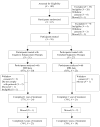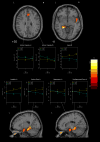Neuroprotective effects of cognitive enhancement therapy against gray matter loss in early schizophrenia: results from a 2-year randomized controlled trial
- PMID: 20439824
- PMCID: PMC3741671
- DOI: 10.1001/archgenpsychiatry.2010.63
Neuroprotective effects of cognitive enhancement therapy against gray matter loss in early schizophrenia: results from a 2-year randomized controlled trial
Abstract
Context: Cognitive rehabilitation has shown efficacy in improving cognition in patients with schizophrenia but the underlying neurobiologic changes that occur during these treatments and support cognitive improvement are not well known.
Objective: To examine differential changes in brain morphology in early course schizophrenia during cognitive rehabilitation vs supportive therapy.
Design: Randomized controlled trial.
Setting: An outpatient research clinic at a university-based medical center that provides comprehensive care services for patients with severe mental illness.
Patients: A total of 53 symptomatically stable but cognitively disabled outpatients in the early course of schizophrenia or schizoaffective disorder.
Interventions: A 2-year trial with annual structural magnetic resonance imaging and cognitive assessments. Cognitive enhancement therapy is an integrated approach to the remediation of cognitive impairment in schizophrenia that uses computer-assisted neurocognitive training and group-based social-cognitive exercises. Enriched supportive therapy is an illness management approach that provides psychoeducation and teaches applied coping strategies.
Main outcome measures: Broad areas of frontal and temporal gray matter change were analyzed with longitudinal, voxel-based morphometry methods using mixed-effects models followed by volumetric analyses of regions that demonstrated significant differential changes between treatment groups.
Results: Patients who received cognitive enhancement therapy demonstrated significantly greater preservation of gray matter volume over 2 years in the left hippocampus, parahippocampal gyrus, and fusiform gyrus, and significantly greater gray matter increases in the left amygdala (all corrected P < .04) compared with those who received enriched supportive therapy. Less gray matter loss in the left parahippocampal and fusiform gyrus and greater gray matter increases in the left amygdala were significantly related to improved cognition and mediated the beneficial cognitive effects of cognitive enhancement therapy.
Conclusion: Cognitive enhancement therapy may offer neurobiologic protective and enhancing effects in early schizophrenia that are associated with improved long-term cognitive outcomes.
Trial registration: ClinicalTrials.gov NCT00167362.
Conflict of interest statement
The authors report no conflicts of interest with this research.
Figures



References
-
- Heinrichs RW, Zakzanis KK. Neurocognitive deficit in schizophrenia: A quantitative review of the evidence. Neuropsychology. 1998;12(3):426–445. - PubMed
-
- Penn DL, Corrigan PW, Bentall RP, Racenstein J, Newman L. Social cognition in schizophrenia. Psychol Bull. 1997;121(1):114–132. - PubMed
-
- Green MF, Kern RS, Braff DL, Mintz J. Neurocognitive deficits and functional outcome in schizophrenia: Are we measuring the right stuff. Schizophr Bull. 2000;26(1):119–136. - PubMed
-
- Green MF, Kern RS, Heaton RK. Longitudinal studies of cognition and functional outcome in schizophrenia: implications for MATRICS. Schizophr Res. 2004;72(1):41–51. - PubMed
Publication types
MeSH terms
Associated data
Grants and funding
LinkOut - more resources
Full Text Sources
Other Literature Sources
Medical

